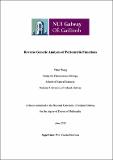| dc.description.abstract | The centrosome is a subcellular organelle that organises the mitotic spindle microtubules to ensure accurate segregation of chromosomes during cell division. Most animal centrosomes comprise a pair of centrioles which are encircled with an electron-dense substance termed the pericentriolar material (PCM). Pericentrin is a large, coiled-coil protein that acts as a scaffold to recruit proteins to the centrosome for PCM assembly. Mutations in the human pericentrin gene which lead to the expression of non-functional protein result in dysfunctional microtubule nucleation and cell cycle checkpoints. To better understand the function of pericentrin, we used reverse genetics to study the roles of pericentrin in centrosome organisation, cell cycle progression and the responses to DNA damage.
We successfully generated Pericentrin (Pcnt) knockouts in hyper-recombinogenic chicken DT40 cells, using a strategy designed to target the promoter region of Pcnt. Targeting of the Pcnt promoter caused Pcnt mRNA levels to decline to 2% of wild-type levels, as determined by quantitative RT-PCR. However, no protein was detectable by immunofluorescence microscopy in the knockout cells. Unexpectedly, Pcnt-deficient cells were viable, but grew slower than controls. Cell cycle analysis and live cell imaging suggest that Pcnt-deficiency leads to a delay in the cell cycle at mitosis. Light and electron microscopy analyses revealed no detectable defects in centrosome composition or ultrastructure in Pcnt-deficient cells. Although centrosomal gamma-tubulin was not recruited efficiently, Pcnt-deficient centrosomes were able to nucleate microtubules as rapidly as wild-type cells. Consistent with the finding of abnormal elongated mitotic spindles, Pcnt-deficient cells had a defect in the satisfaction of the spindle assembly checkpoint after spindle poison treatment. Cell cycle arrest, centrosome amplification and survival rates after ionising radiation treatment were normal in Pcnt-deficient cells. However, it is interesting that pericentrin deficiency abrogated the centrosome hyperamplification noted in Mcph1-/- cells. We found a reduced nuclear CHK1 activation after damage in Pcnt- deficient cells. These data suggest a genetic interaction between Pcnt and Mcph1 in the control of genomic stability through CHK1. | en_US |


